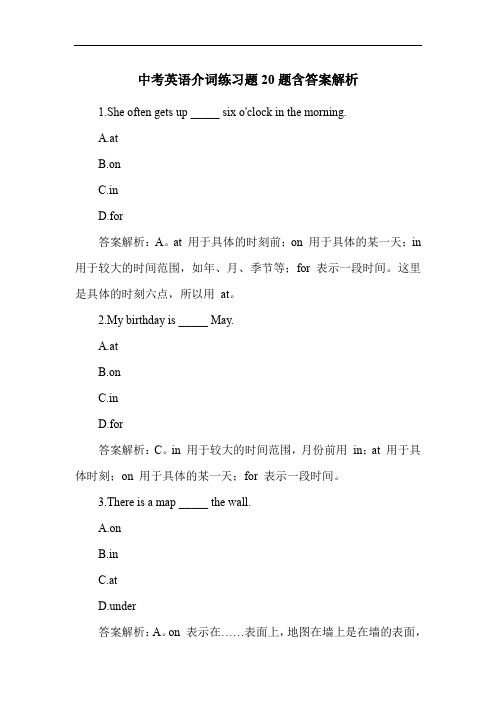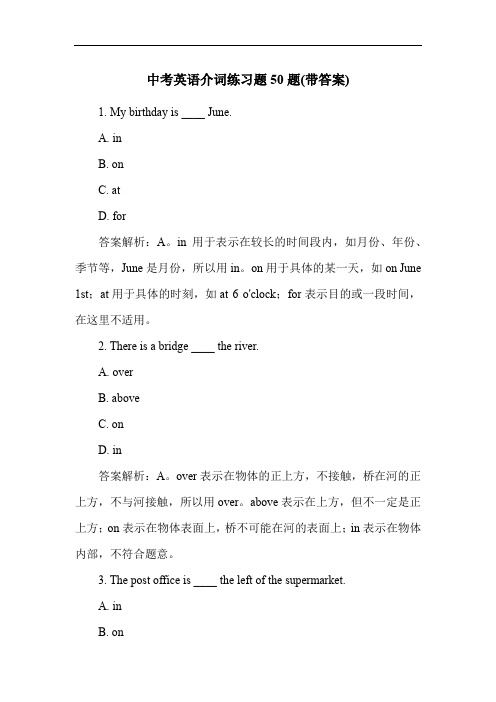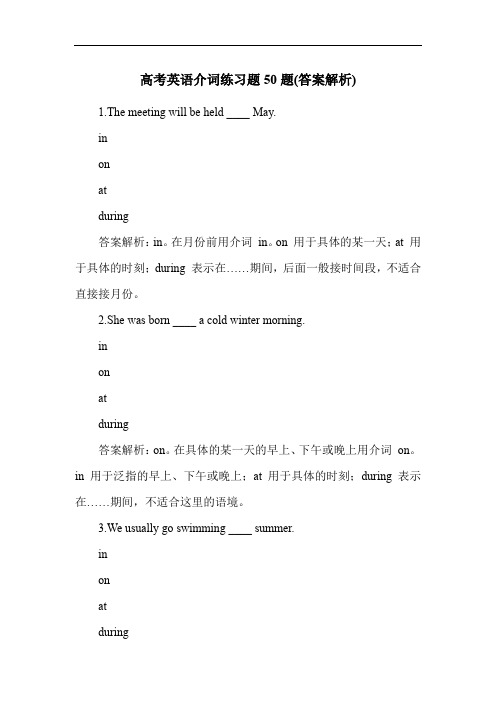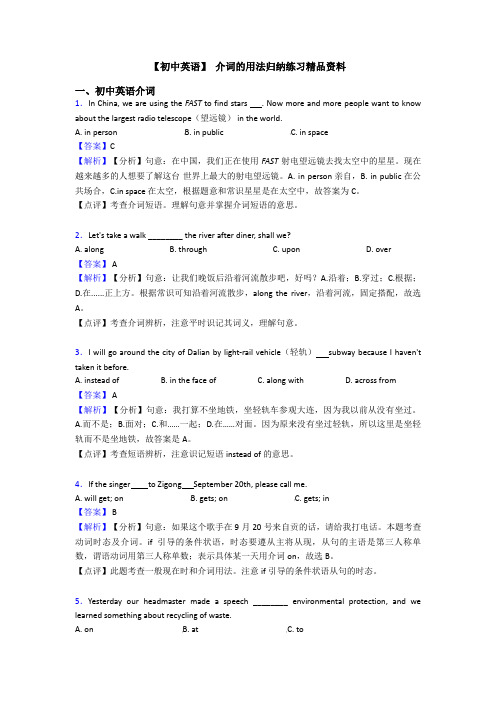【精品】英语介词练习
- 格式:doc
- 大小:57.50 KB
- 文档页数:6

介词专练100题1.____ the age of ten, she had learned to play the piano.A.AfterB.InC.AtD.By2.The old man took a walk every day ____ when it rained.A.exceptB.besidesC.besideD.as3.Look at Lucy! How happy she looks ____ her new dress.A.after B.for C.atD.in4.His mother bought him a new bicycle ____ the morning of his eighteenth birthday. A.onB.inC.atD.before5.—The new dress looks very nice ____ you.—Thank you. I'm glad you say so.A.for B.atC.inD.on6.—How long have you been working in this factory?—_____ 1986.A.InB.FormC.AfterD.Since7.Japan lies ____ the east of Asia, _____ the east of China.A.in; toB.to; inC.in; inD.to; to8.The old lady _____ a pair of thick glass got on the bus.A.inB.havingC.with D.on9.The old woman died not ____ old age but ____ grief.A.from; fromB.of; ofC.of; from D.from; of10.He can speak two other foreign language well ____ English.A.exceptB.besidesC.besideD.except for11.Your composition is excellent, ____ some spelling mistakes.A.exceptB.besidesC.except forD.beside12.The young man was given a medal _____ what he had achieved in his research work. A.sinceB.because of C.because D.as13.Last summer we visited ____ beautiful places ____ Hangzhou, Huangshan and Nanjing. A.so; as B.such; like C.not as; as D.such; asI met Jim ____ the first time when I was in Harry's..14.A.at B.in C.for D.of15.Went for a walk in the forest ____ the moonlight.A.onB.inC.for D.by16.Which subject are you good ____, English or maths?A.onB.inC.ofD.at17.Did you see a girl ____ golden hair walk into the room?A.with B.ofC.has D.in18.____ the opinion of most people it is not good to eat too much meat.A.InB.For C.ToD.On19.It is the best answer ____ the question.A.ofB.about C.for D.to20.They found nothing ___ a stone in the parcel.A.besideB.but C.besidesD.like21.The fish with sharp teeth can eat a person ____ two minutes.A.after B.atC.for D.in22.____ the afternoon of June 18, we'll visit the school.A.InB.AtC.On D.By23.Some food and clothing will be supplied ____ the poor people in the mountain areas. A.for B.toC.atD.with24.He spent a large part of his salary _____ books.A.inB.onC.for D.at25.Sorry, I don't agree ____ your plan.A.toB.onC.about D.with26.There will be a party ____ New Year's Eve.A.onB.atC.for D.from27.I've been here ____ the year 1995.A.ever beforeB.ever sinceC.inD.during28.The Yellow River is the longest river ____ to the Changjiang River.A.next B.than C.toD.forGrapes can be made ____ wine..—29.—Is this bottle of wine made ____ grapes, too?—Sure. And it is made ____ China.A.into, of, for B.into, from, inDof, from, in.from, into, byC.30._____ my visit to Europe, I finally arrived ____ Italy.A.On, inB.On, atC.During, inD.In, at31.The doctor will be free ____ .A.10 minutes later B.after 10 minutesD .10 minutes afterC.in 10 minutes32.They will try their best to compete ___ a race ____ a prize.A.for, forB.in, forC.with, inD.in, in33.It doesn't seem useful ____ them to go on with the work.A.ofB.for C.toD.by34.It's really nice ____ you to come and see me.A.ofB.for C.toD.from35.The door closed ____ itself.A.for B.ofC.toD.in36.It was careless ____ him to drop his watch into the river.A.toB.with C.for D.of37.Since I came to China I've known that about seven people ____ ten speak Putonghua. A.ofB.toC.inD.about38.____ last month, Jack had been late for three times.A.By B.Since C.InD.For39.Let's walk over ____ the sun ____ the other side of the street.A.in, toB.to, on C.under, to D.by, at40.They went to school by bike ____ foot today.A.but B.instead of on C.but onD.instead of41.I knew nothing about the accident ____ what I read in the paper.A.but B.instead of on C.but onD.instead ofIt is not always east to tell right ____ wrong..42.A.or B.between C.and D.from43.We walked ____ Tian An Men square to the Monument ____ the People's Heroes. A.across, to B.across, of C.through, forD.past, to44.The boat is passing ____ the bridge.A.underB.through C.acrossD.towards45.They will leave a week ____ today. I do hope they can finish the work.A.fromB.onC.byD.for46.We need fifteen more people ____ our team to do the job.A.but B.exceptC.as wellD.besides47.I couldn't sleep well ____ all the windows open.A.when B.with C.for D.because of48.I recognized the handwriting _____.A.as our monitor B.like our monitorD.like that of my monitorC .as that of our monitor's49.Sports and games can be ____ great help to us. Let's all do more sports.A.ofB.with C.for D.in50.____ the two stories I've just read, I like the one written by the young lady better. A.InB.By C.OfD.From51.We planned to get to London ____ Monday, but I didn't arrive ____ Friday. A.on, onB.till, onC.to, from D.on, until52.The accident happened ____ a cold winter morning.A.inB.onC.for D.by53.About twenty percent of the population of our country live ____ wages.A.byB.onC.with D.in54.Your voice sounds different ____ the phone.A.inB.for C.from D.on55.The house is ____ fire; call ____ help quickly, or break the glass to sound the alarm. A.on, forB.at, forC.in, to D.on, to56.A new bridge will be built ____ the river.through.D over .C in.B by.A.57.Our National Flag stands out brightly ____ the blue sky.A.againstB.byC.under D.over58.Eating too much sweets and chocolates _____ meals is bad for you.A.amongB.through C.between D.for59.She looks quite young ____ her age.A.for B.ofC.inD.about60.I hope you can answer the paper ____ ink, not ____ pencil.A.at, withB.with, in a C.in, with a D.with, in61.The small village lies ____ the west of the river.A.atB.inC.from D.to62.The children are really hungry now, so we'd better find a restaurant to eat ____.A.atB.for C./ D.with63.The manager walked ____ the room, not knowing what to do with the workers. A.back and forth B.to and fromDup and down .backwards and forwardsC.64.Shall we make it a rule that no language ____ English should be spoken in an English Class.A.but B.besidesC.unlessD.like65.It is rude to make fun ____ the disabled.A.atB.about C.ofD.with66._____ the bad weather, we would have gone picnicking yesterday.A.In spite ofB.But forC.Because ofD.As for67.It's very kind ____ to help us ____ the harvest.A.of you; in B.for them; with C.of them; with D.for you; in68.They look _____ the way as the key _____ success.A.for; ofB.through; forC.on; to D.at; with69.It seems that he is always ____.A.in hurry B.in a hurry C.with a hurryD.with hurryGrapes are made ____ wine. That is to say, wine is made _____ grapes..70.A.of, into B.into, of C.from, from D.into, from71.The old couple went out for a walk every morning ____ when it rained.A.besidesB.except forC.exceptD.except that72.They used to live ____ 101 Heping Road, Tianjin.A.onB.atC.toD.of73.Can you imagine how excited my grandma was the first time she talked to me ____ telephone?A.onB.byC.over D.through74.Pop singers both at home and abroad are very popular ____ young people.A.byB.toC.with D.for75.—Why were you absent ____ school yesterday?—I was ill ____ bed.A.from, in B.to, on C.at, inD.in, on76.He introduced himself ____ Big John, but his real name is John Williams.A.toB.like C.asD.for77.As a housekeeper, ____ working, washing and sewing, she had to take care of four small Children.A.besideB.exceptC.except forD.besides78.____ everyone's surprise, the seven-year-old boy worked out the problem ____ no difficulty.A.To, with B.In, with C.To, in D.For, in79.The old men was ____ help, he is dying.A.without B.besideC.beyondD.against80.We offered him our congratulations ____ his achievements.A.atB.onC.for D.of81.It was a story ____ slum life(贫民窟)in Chicago.A.inB.about C.from D.of82.A steamer was going along ____ full speed, when it suddenly got into shallow water and ran aground.by.D with .C on.B at.A.83.John bought an expensive walkman ____ the money his father had given him.A.with B.byC.inD.through84.I knew nothing about it ____ he told me the other day.A.exceptB.except forC.except whatD.besides that85.The teacher together with ____ is going to see the film.A.usB.we C.our D.they86.Many new houses and tall buildings have been set up for teachers and it ____ an improvement of their conditions.A.has brought about B.has brought upD .C.has brought around has brought for87.In the march ____ the blazing (炙热)sands they experienced hunger, thirst and heat. A.through B.past C.crossD.across88.The bus stop is just across the street. It means ____.A.The bus stop is just on the other side of the street.B.The bus stop is just on the opposite side of the street.C.If you want to get to the bus stop, you must walk across the street.D.the bus stop is over there when you walk straight along the street.89.With her brown hair and blue eyes Jane seems to ____ her mother but in other ways she is more like her father.A.look after B.take after C.run after D.be after90.Not only did they plant many trees but also they took measures ____ tree diseases. A.for B.againstC.through D.to91.Some people became passive(not active) and stop working whenever anything ____ their wishes or wills.A.is against B.runs againstC.goes againstD.is for92.Ah. Margaret, come ____, the fruit shop is quite near. Just ____ the corner. A.along, behind B.across, around C.with, acrossD.along, around93.Try to be clam and sensitive ____ of danger.A.at the moment B.of the moment C.in the moment D.on the moment____ o the term, our form-teacher addressed us in an excellent speech. He impressed us a .94.lot.A.At the beginningB.In the beginningC.In the endD.At the middle95.He has a good head ____.A.by businessB.in businessC.for businessD.on business96.It happened to be very cold ____ the morning of our sports meet.A.atB.ofC.onD.with97.The table belongs ____ the corner.A.toB.inC.with D.on98.Tom was gentle and he often talked with others ____ a low voice but this time he shouted suddenly ____ the top of his voice.A.in, atB.at, inC.at, withD.in, with99.The policeman angrily seize the man ____ the collar, and asked him what he meant bysuch bad behaviour.A.byB.inC.with D.at100.They themselves take their work for granted, and do not care what strangers may think____ it.A.atB.about C.inD.with答案:1-5CADAD 6-10DACBB 11-15CBDCB 16-20 DAADB 21-25 DCBBA 26-30 ABABA 31-35 CBBAB 36-40 DCABB 41-45 CDAAA 46-50 ABACA 51-55 DBBDA 56-60 CACAC 61-65 DACAC 66-70 BCCBD 71-75 CBBCA 76-80 CDACB 81-85 BAACA 86-90 ADABB 91-95 ABCAC 96-100 C DAAB。

中考英语介词练习题20题含答案解析1.She often gets up _____ six o'clock in the morning.A.atB.onC.inD.for答案解析:A。
at 用于具体的时刻前;on 用于具体的某一天;in 用于较大的时间范围,如年、月、季节等;for 表示一段时间。
这里是具体的时刻六点,所以用at。
2.My birthday is _____ May.A.atB.onC.inD.for答案解析:C。
in 用于较大的时间范围,月份前用in;at 用于具体时刻;on 用于具体的某一天;for 表示一段时间。
3.There is a map _____ the wall.A.onB.inC.atD.under答案解析:A。
on 表示在……表面上,地图在墙上是在墙的表面,所以用on;in 表示在……里面;at 用于具体的地点或时刻;under 表示在……下面。
4.My book is _____ the desk.A.onB.inC.atD.under答案解析:A。
on 表示在……上面,书在桌子上是在桌子的表面,所以用on;in 表示在……里面;at 用于具体的地点或时刻;under 表示在……下面。
5.I often play basketball _____ school.A.afterB.beforeC.atD.in答案解析:C。
at school 是固定搭配,表示在学校;after 和before 后面通常接具体的时间或动作;in 后面接较大的地点范围,如城市、国家等。
6.The cat is _____ the chair.A.onB.inC.atD.under答案解析:D。
under 表示在……下面,猫在椅子下面符合逻辑;on 表示在……上面;in 表示在……里面;at 用于具体的地点或时刻。
7.I go to bed _____ night.A.atB.onC.inD.for答案解析:A。

中考英语介词练习题50题(带答案)1. My birthday is ____ June.A. inB. onC. atD. for答案解析:A。
in用于表示在较长的时间段内,如月份、年份、季节等,June是月份,所以用in。
on用于具体的某一天,如on June 1st;at用于具体的时刻,如at 6 o'clock;for表示目的或一段时间,在这里不适用。
2. There is a bridge ____ the river.A. overB. aboveC. onD. in答案解析:A。
over表示在物体的正上方,不接触,桥在河的正上方,不与河接触,所以用over。
above表示在上方,但不一定是正上方;on表示在物体表面上,桥不可能在河的表面上;in表示在物体内部,不符合题意。
3. The post office is ____ the left of the supermarket.A. inB. onC. atD. to答案解析:B。
on the left/right of是固定搭配,表示在某物的左边/右边。
in表示在内部;at表示在小地点;to表示在某个方向上,不强调左右关系。
4. She usually gets up ____ six o'clock.A. inB. onC. atD. for答案解析:C。
at用于具体的时刻,six o'clock是具体的时刻,所以用at。
in用于较长时间段;on用于具体某一天;for表示目的或一段时间,均不符合题意。
5. We will go to Paris ____ next week.A. inB. onC. atD. /答案解析:D。
next week前不需要加介词,表示将来的时间。
in 用于较长时间段;on用于具体某一天;at用于具体时刻,都不符合这里的用法。
6. The cat is hiding ____ the table.A. underB. belowC. inD. on答案解析:A。

高考英语介词练习题50题(答案解析)1.The meeting will be held ____ May.inonatduring答案解析:in。
在月份前用介词in。
on 用于具体的某一天;at 用于具体的时刻;during 表示在……期间,后面一般接时间段,不适合直接接月份。
2.She was born ____ a cold winter morning.inonatduring答案解析:on。
在具体的某一天的早上、下午或晚上用介词on。
in 用于泛指的早上、下午或晚上;at 用于具体的时刻;during 表示在……期间,不适合这里的语境。
3.We usually go swimming ____ summer.inonatduring答案解析:in。
在季节前用介词in。
on 用于具体的某一天;at 用于具体的时刻;during 表示在……期间,后面一般接时间段,不适合直接接季节。
4.The train leaves ____ 8 o'clock.inonatduring答案解析:at。
在具体的时刻用介词at。
in 用于泛指的时间段,如年份、月份、季节等;on 用于具体的某一天;during 表示在……期间,不适合这里的语境。
5.They arrived ____ the afternoon of June 15th.inonatduring答案解析:on。
在具体的某一天的下午用介词on。
in 用于泛指的下午;at 用于具体的时刻;during 表示在……期间,后面一般接时间段,不适合直接接具体的某一天的下午。
6.My birthday is ____ July.inonduring答案解析:in。
在月份前用介词in。
on 用于具体的某一天;at 用于具体的时刻;during 表示在……期间,后面一般接时间段,不适合直接接月份。
7.He often goes fishing ____ weekends.inonatduring答案解析:on。

初一英语介词练习题40题(带答案)1. There is a big tree ____ my house.A. in front ofB. in the front ofC. at the front ofD. front of答案解析:A。
“in front of”表示在物体外部的前面,房子和树是相互独立的两个物体,树在房子的前面,用“in front of”;“in the front of”表示在物体内部的前面,例如在教室内部的前面,不符合题意;没有“at the front of”这种用法;“front of”是错误表达。
2. My birthday is ____ June.A. onB. inC. atD. of答案解析:B。
“in”用于表示在较长的时间范围内,如年、月、季节等,June是月份,所以用“in”;“on”用于具体的某一天,如“on June 1st”;“at”用于具体的时刻,如“at 6 o'clock”;“of”表示所属关系,不符合题意。
3. She goes to school ____ foot every day.A. byB. onC. withD. in答案解析:B。
“on foot”是固定搭配,表示步行;“by”后面接交通工具时,直接接交通工具名词,如“by bus”;“with”表示和……一起或者用……工具,不符合题意;“in”通常不用于表示步行这种交通方式。
4. The book is ____ the desk.A. onB. aboveC. overD. up答案解析:A。
“on”表示在物体表面上,书在桌子表面,所以用“on”;“above”表示在上方,不一定垂直,强调高于;“over”表示垂直上方,通常有覆盖的意思;“up”表示向上的方向,不是介词表示位置关系的用法。
5. I often get up ____ six o'clock in the morning.A. atB. onC. inD. for答案解析:A。

【初中英语】介词的用法归纳练习精品资料一、初中英语介词1.In China, we are using the FAST to find stars . Now more and more people want to know about the largest radio telescope(望远镜) in the world.A. in personB. in publicC. in space【答案】C【解析】【分析】句意:在中国,我们正在使用FAST 射电望远镜去找太空中的星星。
现在越来越多的人想要了解这台世界上最大的射电望远镜。
A. in person亲自,B. in public在公共场合,C.in space 在太空,根据题意和常识星星是在太空中,故答案为C。
【点评】考查介词短语。
理解句意并掌握介词短语的意思。
2.Let's take a walk ________ the river after diner, shall we?A. alongB. throughC. uponD. over【答案】 A【解析】【分析】句意:让我们晚饭后沿着河流散步吧,好吗?A.沿着;B.穿过;C.根据;D.在......正上方。
根据常识可知沿着河流散步,along the river,沿着河流,固定搭配,故选A。
【点评】考查介词辨析,注意平时识记其词义,理解句意。
3.I will go around the city of Dalian by light-rail vehicle(轻轨) subway because I haven't taken it before.A. instead ofB. in the face ofC. along withD. across from【答案】 A【解析】【分析】句意:我打算不坐地铁,坐轻轨车参观大连,因为我以前从没有坐过。
A.而不是;B.面对;C.和……一起;D.在……对面。
介词练习题及答案介词练习题及答案在英语学习中,介词是一个非常重要的语法部分,也是一个让很多学习者头疼的问题。
介词的使用和搭配需要掌握好,才能更准确地表达自己的意思。
为了帮助大家更好地理解和掌握介词的用法,下面将给大家提供一些介词练习题及答案。
练习题一:选择合适的介词填空。
1. I will meet you _____ the park at 3 o'clock.2. The book is _____ the desk.3. The cat jumped _____ the wall.4. We usually go swimming _____ summer.5. She is good _____ playing the piano.答案:1. in2. on3. over4. in5. at练习题二:根据句子的意思,选择合适的介词填空。
1. He arrived _______ the airport _______ time.2. My brother is interested _______ sports.3. The children are afraid _______ the dark.4. She is proud _______ her achievements.5. We are waiting _______ the bus stop.答案:1. at, on2. in3. of4. of5. at练习题三:根据句子的意思,选择合适的介词填空。
1. The cat is hiding _______ the bed.2. They are going to travel _______ Europe next year.3. The movie starts _______ 7 o'clock.4. I am going to the supermarket _______ some groceries.5. He is sitting _______ the table.答案:1. under2. in3. at4. for5. at练习题四:选择合适的介词填空。
英语介词练习题及答案解析1.My mother often says,“Stand tall like the sunflower and be proud _____ who you are.”A.ofB.withC.atD.in答案:A解析:译文:我的妈妈经常说:“像向日葵一样站得高高的,为你自己的身份而自豪”。
本题考查介词。
Be proud of… 为…感到自豪,故选A。
2.Humans cannot make progress _____ dreams.A.withB.withoutC.throughD.about答案:B解析:译文:没有梦想,人类不可能进步。
本题考查介词。
A. with 有着,带有,与;B. 没有;C. through通过;D. about 大约,关于。
根据句意可知选without,故选B。
3.It’s dangerous _____ to play with the wild animal.A. for usB. of usC. to usD. in us答案:A解析:译文:与野生动物玩耍对我们来说是很危险的。
本题考查非谓语中的固定句型。
句型“It is/was+ adj.+ for/of sb. to do sth. ”中,adj.修饰人,就用介词of,adj.修饰物,就用介词for。
本题的形容词dangerous修饰事情危险,故选A。
4.It’s clever _____ you to make so many toy ships.A. ofB. forC. toD. on答案:A解析:译文:你做了这么多玩具船,真是太聪明了。
本题考查非谓语中的固定句型。
句型“It is/was+ adj.+ for/of sb. to do sth. ”中,adj.修饰人,就用介词of,adj.修饰物,就用介词for。
本题的形容词clever修饰人聪明,故选A。
5.The People’s Republic of China was founded _____ October1st,1949.We’ll celebrateits 70th anniversary this year.A.inB.onC.atD. from答案:B解析:译文:中华人民共和国与1949年十月一日成立。
介词练习题(含答案)经典一、初中英语介词1.— What are you doing?—I'm looking the kids. They should be back for dinner now.A. afterB. atC. forD. up【答案】 C【解析】【分析】句意:——你在做什么?——我正在找孩子们,他们现在应该回来吃晚饭了。
look after 照顾;look at 看……;look for 寻找;look up 查找,一般指查词典。
根据They should be back for dinner now可知,孩子们还没有回来,说话人在找他们。
故选C。
【点评】此题考查短语辨析,注意其意思和用法。
2.The high-speed train Qingdao and Beijing travels faster now. The train ride takes only about three hours.A. fromB. amongC. inD. between【答案】 D【解析】【分析】句意:现在青岛和北京之间的高速列车跑得更快了。
火车车程只有大约三个小时。
from 从;among 在……中;in 在……里;between 在……之间;根据后面的and,可知是固定搭配,between…and…,在……和……之间,故选D。
【点评】此题考查介词辨析。
根据句意和上下文的联系确定所使用的介词。
3.—Do you have this T-shirt in a different color?—I'm afraid not. It only comes red.A. ofB. inC. for【答案】 B【解析】【分析】句意:——你有不同颜色的这件t恤吗?——恐怕没有。
只有红色。
根据T-shirt in a different color,可知是in+颜色,故选B。
【点评】考查介词辨析,注意辨别介词of、in和for 的用法。
(英语)英语介词练习题20篇一、初中英语介词1.Mum won't let Simon go out unless he promises to be back ______10 o' clock tonight.A. tillB. beforeC. asD. since【答案】 B【解析】【分析】句意:除非西蒙答应今晚10点前回来,否则妈妈不会让他出去的。
A. till 介词或连词,直到;B. before连词或介词,在……之前;C. as连词或介词,当……时候或作为;D. since连词,自从……以来。
晚上回家应该是10点前,“在……之前”用before。
故选B。
【点评】考查介词辨析,注意理解介词意思,理解句意。
2.Humans can not make progress dreams.A. withB. withoutC. throughD. about【答案】 B【解析】【分析】句意:没有了梦想,人类就不会进步。
A.带着,有;B.没有;C.通过;D.关于。
梦想是人类前进的动力,根据Humans can not make progress,可知人类不会进步,是因为没有梦想,应会使用介词without,故答案是B。
【点评】考查近词辨析,注意识记介词without的用法。
3.My mother often says, "Stand tall like the sunflower and be proud who you are." A. of B. with C. at D. in【答案】 A【解析】【分析】句意:我妈妈经常说,像向日葵一样挺起胸膛,为自己感到骄傲。
be proud of,固定搭配,为……骄傲,故选A。
【点评】考查固定搭配,注意be proud of的用法。
4.—Is that your headmaster?—You mean the man ________ blue?A. onB. withC. in【答案】 C【解析】【分析】句意:——那是你的校长吗?——你是指穿着蓝色衣服的男士吗?固定搭配,in+颜色,穿着……颜色衣服的人,A 在……上面,B 和……,表伴随,与题意不符,故选C。
【精品】英语介词练习一、单项选择介词1.The unemployment rate has decreased _____ 2% to 5.4%, compared with 7.4 % last year. A.by B.from C.with D.on【答案】A【解析】试题分析:句意:失业率与去年的7.4%相比,已经到了5.4%,下降了2%。
从句意可知此处指失业率下降了,by可以指相差的程度,选A。
考点:考查介词用法2.Would you mind not picking the flowers in the garden? They are __________everyone's enjoyment.A.in B.at C.for D.to【答案】C【解析】【详解】考查介词。
句意:不要摘花园里的花行吗?它们是供大家欣赏的。
此处表示目的,“为了”的意思,故用介词for。
短语to everyone's enjoyment“让大家开心的是……”,只做状语;短语for everyone's enjoyment“为了每个人的快乐”。
故选C。
3.Most people work because it’s unavoidable. ________, there are some people who actually enjoy work.A.As a result B.In additionC.By contrast D.In conclusion【答案】C【解析】【详解】考查介词短语。
句意:大部分人工作是因为不可避免,相比之下,有些人确实喜欢工作。
A. As a result结果;B. In addition此外;C. By contrast相比之下;D. In conclusion总而言之。
“不可避免”表示一种无奈,也就是说,很多人是不得不工作的。
后句的表达是“事实上有些人喜欢工作”,“喜欢”和“不得不”刚好构成一种对比,故选C。
【点睛】本题关键词是不可避免(unavoidable)。
本题需要通过分析句子成分,判断前后的意思是相反的。
介词的短语的考查,四个选项意思都是相差很大的,该题需要能够正确理解句子隐含意思。
平时要注重识记介词短语的,另外这些介词短语表达可以运用在写作中。
4.(北京)When you drive through the Redwood Forests in California, you will be___________ trees that are over 1,000 years old.A.among B.againstC.behind D.below【答案】A【解析】【分析】【详解】考查介词。
句意:当你开车穿过加州的红木森林时,你将会位于超过百年历史的树木之间。
be among 位于……之间; be against 反对; be behind 在……后面; be below在……之下。
根据句意,故选A。
【点睛】对于介词辨析题目,首先可以从句意着手,看懂句意是解答此类题目的关键,其次四个选项的意思也要了如指掌。
这对于平时学生的基本知识进行考查,学生在平时的学习中要勤积累,多记忆,多多积累,以便在考试时能够迅速准确的答出,还有的是一些固定搭配,需要了如指掌。
5. passion, people won't have the motivation or the joy necessary for creative thinking. A.For . B.Without C.Beneath D.By【答案】B【解析】【详解】考查介词辨析。
句意:没有激情,人们就不会有创新思维所必须的动机和快乐。
A. For 对于;B. Without没有; C. Beneath在……下面 ; D. By通过。
没有激情,人们就不会有创新思维所必须的动机和快乐。
所以空处填介词without。
故填without。
6.Soon after getting off his horse, the captain appeared at the second-floor windows, ______ he could see nothing but trees.A.where B.from whereC.which D.from which【答案】B【解析】【详解】考查定语从句。
句意:下马不久,上尉就出现在二楼的窗口了。
他从那里除了树木什么也没看到。
he could see nothing but trees.为非限制性定语从句修饰先行词at the second-floor windows,故用from where,相当于and from at the second-floor windows,而from where 比where具体形象,故选B。
【点睛】From where 引导定语从句的用法。
用于引导非限制性定语从句,在意义上相当于 and fromthere(从那儿)。
如:He hid himself in a tree, from where he could see the enemy in the distance. 他躲在一棵树上,从那儿他可以看到远处的敌人。
We went up to the roof, from where we had a good view of the procession. 我们爬上屋顶,从那儿可以很好地观看游行。
Soon after getting off his horse, the captain appeared at the second storey windows, from where he could see nothing but trees.下马不久,上尉就出现在二楼的窗口了.他从那里除了树木什么也没看到.(引导定语从句)划线部分相当于…,and from at the windows…不可变为from whic h…,直接用where不如用from where更具体.2、She climbed up to the top of the hill, from where she could have a good view of the whole town.她登上山顶,从那里她可以一览全城风光.(引导定语从句)划线部分相当于…,and from on the top of the hill或from on the top of which…,不可变为from which,也可直接用where引导,但语义较为含糊,不如用from where更加生动、形象、具体.7.Maybe some of you are curious about what my life was like on the streets because I’ve never really talked about it ______.A.in place B.in turn C.in force D.in depth【答案】D【解析】【详解】考查介词短语辨析。
句意:也许你们中的一些人对我在街上的生活是什么样子很好奇,因为我从未真正深入地谈论过它。
A. in place就位,适当的;B. in turn反过来,轮流地;C. in force有效地;D. in depth深入地,全面地。
根据语境“一些人对我在街上的生活很好奇”,是因为我没有“深入(in depth)”谈论过,故选D。
8. The equipment for all of the disabled people ought to be _________ easy reach in public. A.beyond B.within C.near D.around【答案】B【解析】试题分析:考查介词。
A超越;B在……之内;靠近;D周围。
句意:所有残疾人设备都应当在公共场合容易得到。
故B正确。
考点:考查介词9.At the railway station, the mother waved goodbye to her daughter until the train was_______.A.out of sight B.out of reachC.out of order D.out of place【答案】A【解析】试题分析:考查介词短语辨析。
A看不见;B够不着;C杂乱无序;D不协调;句意:在火车站,这位母亲向儿子挥手直到火车看不见为止。
根据句意说明A正确。
考点:考查介词短语辨析10.Tom always goes jogging in the morning and he usually does push-ups too to stay ________. A.in place B.in order C.in shape D.in fashion【答案】C【解析】试题分析:考查介词短语辨析及语境理解。
A. in place在适当的位置;B. in order按顺序;C. in shape处于良好状态;健康;D. in fashion流行,时兴。
句意:汤姆早上总是慢跑,他通常也做俯卧撑来保持良好身体。
故C正确。
考点:考查介词短语辨析及语境理解11.“We’ve never sold anyone’s data,” Zuckerberg, Facebook CEO, said_______British lawmaker Damian Collins, who released some emails between Facebook and other tech companies.A.in response to B.in contrast toC.in proportion to D.in addition to【答案】A【解析】【详解】考查介词短语词义辨析。
句意:“我们从未售卖任何人的数据”,脸书CEO扎克伯格回复英国立法者Damian Collins说,其公开了在脸谱网和其他科技公司之间一些电子邮件的。
A. in response to回复;B. in contrast to与... ...相反;C. in proportion to与... ...成比例;D. in addition to除... ...之外(还)。
故选A。
12.It was obvious that the meeting was concerned ________ the housing reform and everyone present was concerned ________ their own interests.A.with;with B.with;forC.for;about D.about;with【答案】B【解析】试题分析:考查动词短语辨析。